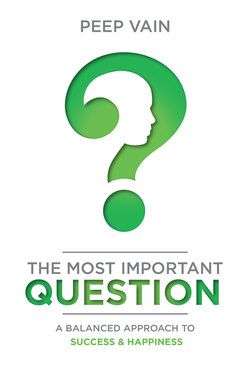Читать книгу The Most Important Question - Peep Vain - Страница 12
На сайте Литреса книга снята с продажи.
What we’re supposed to want
ОглавлениеOften, we choose the things we’re supposed to want. When’s the last time you took a promotion because you just don’t turn down a promotion, or because it’s the next logical step in a career? But is a career what you really want? Or is a career something you’re supposed to want?
Many people are also influenced by odd factors when making decisions about education and vocation. During Soviet times, many chose a major of food processing technology or public catering management in the local technical university. At the time, it almost served as a “ticket” to work as a manager in a restaurant or a grocery store. I don’t believe most who studied catering felt an inner urge to seek that profession, but during those strange times it was both prestigious and useful. (Many food products were in real shortage and never made it to the store shelves. Instead they were distributed to friends and family members of the folks in charge.)
A current version of that might be Americans studying in law schools. There’s nothing wrong with earning a law degree. But did they want to become lawyers as kids? Really? And not bus drivers or firemen? Then why did they end up choosing law school? Because it sounded promising, and because they felt like they needed to do something?
After high school, I too made educational choices in a similar way. I had no clue as to what to study. Looking back, I often refer to the 18-year-old Peep Vain as a young man without any real interests. Considering my parents’ background and my own social circles, going to college was an obvious choice. I did not care much to leave home for another town. Since my father was a physicist and my whole family were college graduates, I started to investigate similar options. Radio engineering was one of the most prestigious paths for engineering majors, and there were many more applicants than openings. And so, in 1986, I took the entrance exams and became a student in the department of radio engineering. Lack of thought and self-knowledge, combined with convenience, led me to a decision that had nothing to do with my real wants, my nature and needs. Years later I asked a friend whether the other guys ever wondered what I was doing in radio engineering. Of course they did, replied the friend. Why didn’t you say something? I inquired. It would have been too awkward, was the reply. Luckily, I only stayed there for two semesters. With all due respect to engineers, I really would have not wanted to be one.
